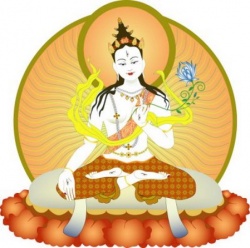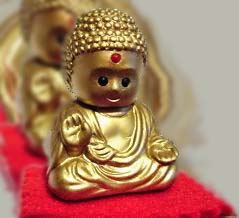Pancasikha
Pancasikha A Gandhabba. His favourite instrument was the Beluvapanduvina (q.v.).
He was considered a favourite of the Buddha (DA.iii.699), and when Sakka visited the Buddha at the Indasalaguha in order to ask him certain questions, he sent Pancasikha in advance, that he might obtain permission for the interview.
The episode in given in full in the Sakkapanha Sutta (D.ii.263ff.).
Pancasikha approached the Buddha and playing on his vina, sang of the beauties of the Buddha, the Doctrine, Arahants and Love.
The verses really formed a love poem addressed to his beloved,
Bhadda Suriyavaccasa, daughter of the Gandhabba Timbaru.
The Buddha praised his music and song and questioned him about the poem.
He confessed that when the Buddha was staying under the Ajapala nirgodba, before the Enlightenment, he (Pancasikha) had met Suriyavaccasa going with her father to dance before Sakka.
Pancasikha thereupon fell in love with her; but she favoured the suit of Sikhandi, son of Matali.
Pancasikha thereupon composed a song, which he sang to her.
She was greatly pleased with the references in the song to the Sakyan sage of whom she had heard when she went to the Sudhammasabha, (on this occasion Sakka, pronounced his 8 fold eulogy of the Buddha, contained in the Mahagovinda Sutta, says Buddhaghosa, DA.ii.704) and she consented to marry Pancasikha.
It is said that Sakka blessed the marriage in return for Pancasikhas intercession with the Buddha on his behalf.
In the Janavasabha Sutta (D.ii.211; also in the Mahagovinda Sutta, D.ii.230) it is stated that when Brahma Sanankumara appeared before the assembly of the gods of Tavatimsa and materialized himself he assumed the form of Pancasikha.
Buddhaghosa says (DA.ii.640), by way of explanation, that all the devas loved Pancasikha and wished to resemble him.
In the Mahagovinda Sutta (D.i.220; cp. Mtu.iii.197ff) Pancasikha is represented as conveying to the Buddha a full report of the happenings in the assembly of the devas, when Sakka spoke the Buddhas praises.
No really satisfactory explanation is found in the Commentaries of Pancasikhas name.
Buddhaghosa says (DA.ii.647) Pancasikho ti pancaculo, pancakundaliko, and goes on to say that Pancasikha was born once as a human being, and, while yet a boy wearing his hair in five knots* (pancaculakadaraka kale), he became chief of those who tended the calves.
But in one place (DA.i.296) Buddhaghosa says that one way of insulting a man was to shave his head, leaving him five locks of hair (garahaya ti pancasikha mundakaranam).
And, again (SA.i.171), he mentions that Sanankumara retained his eternal youth because in a previous life he had developed jhana while yet a lad (pancasikhakumarakale). See also J.vi.496,

